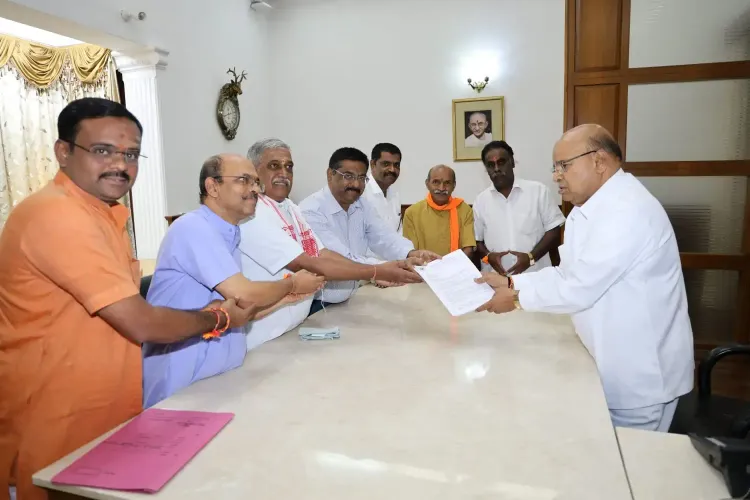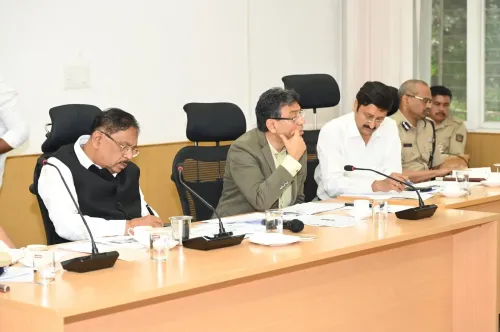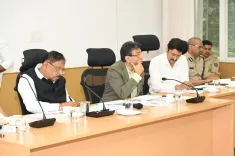Should Hindu Temples Be Freed from Government Control?

Synopsis
Key Takeaways
- VHP advocates for temple autonomy from government control.
- Karnataka Temple Scheme proposes democratic management.
- High Court ruling challenges current regulations.
- VHP emphasizes constitutional compliance in their proposal.
- Equal treatment of all temples is a key demand.
Bengaluru, Sep 26 (NationPress) A group representing the Visva Hindu Parishad (VHP) from Karnataka's Southern and Northern regions has approached Governor Thaawarchand Gehlot with a memorandum advocating for the liberation of temples and Hindu religious sites in the state from governmental oversight.
The VHP has also suggested consideration of its 'Karnataka Temple Scheme.'
The memorandum, filed through the VHP Karnataka Dakshin, urged the examination of a novel framework to address the delicate situation stemming from the Karnataka High Court's ruling that deemed The Karnataka Hindu Religious Institutions and Charitable Endowments Act, 1997, along with its amendments, as “unconstitutional.”
The VHP asserted, “The only path to ensure that all types of temples are treated equally under the law is to liberate all Hindu temples from governmental oversight. Once freed, a new, constitutionally valid, and universally acceptable system for temple administration is essential. The Karnataka Temple Scheme proposes to establish committees for temple management democratically through both direct and indirect elections.”
“This Karnataka Temple Scheme has been crafted by addressing the various concerns raised by the court and aligning with past Supreme Court rulings. We implore that the necessary laws and regulations be enacted to implement this scheme within the state. We are ready to provide full cooperation in this endeavor,” stated the right-wing organization.
“The High Court has ruled that The Karnataka Hindu Religious Institutions and Charitable Endowments Act, 1997, and its amendments, which govern temples currently under governmental control in Karnataka, are unconstitutional. Despite the Supreme Court affirming that the “Act is alive,” the management of temples continues to operate under this Act.
“The case is still pending final resolution in the Supreme Court. However, this precarious situation cannot persist indefinitely. Thus, a new, constitutionally valid framework for the management of Hindu temples in Karnataka is needed. To facilitate this, the VHP proposes a constitutionally sound Karnataka Temple Scheme established within a democratic framework.”
“There is a risk that the Supreme Court might echo the High Court’s viewpoint. Should the Supreme Court issue a similar ruling, temple management could enter a state of uncertainty. Therefore, the proposed Karnataka Temple Scheme should be implemented with the required approvals in the ongoing Supreme Court case,” demanded the VHP.
“By doing this, the aspiration of the majority Hindu community for ‘Hindu administration for Hindu temples’ will be realized,” emphasized the right-wing group.
The VHP maintained that the scheme complies with the Constitution, as it pertains to religious and charitable institutions of the entire Hindu community in alignment with Article 14.
It is consistent with Articles 25 and 26 of the Constitution, as stated.
“The administration of these diverse temple groups is not equal under the law. Courts are suggesting that the same law must apply universally. This means that either all temples should be subject to governmental control, or all should be liberated from it,” the VHP urged.
“There is no constitutional provision allowing the government to regulate the administration of the first three types of temples (private, mutts, denominations). It is an undisputed fact that the Constitution prohibits governmental control over private temples and trusts,” asserted the right-wing organization.
“The landmark Supreme Court decision in The Commissioner, Hindu Religious Endowments vs Sri Lakshmindra Thirtha Swamlar (the Shirur Mutt case) established that the government cannot govern mutts and religious denomination institutions,” the VHP concluded.









